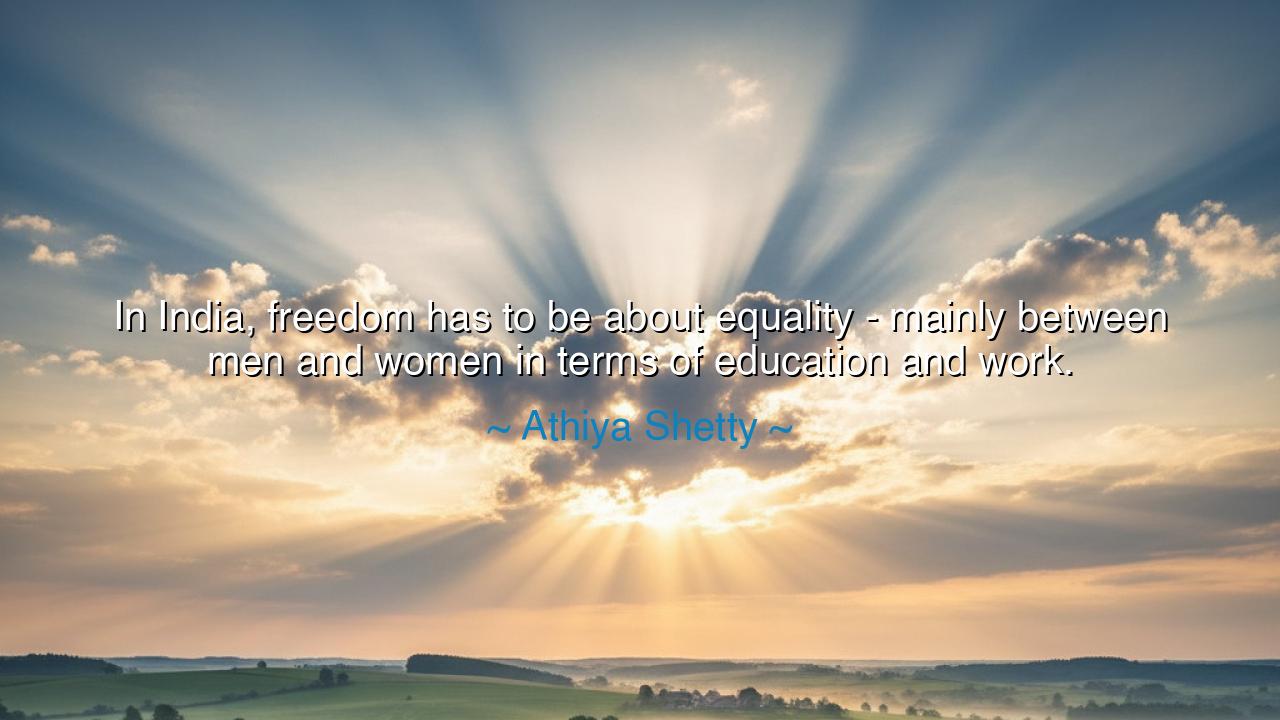
In India, freedom has to be about equality - mainly between men
In India, freedom has to be about equality - mainly between men and women in terms of education and work.






O children of the future, gather close, for I bring you the words of Athiya Shetty, a voice that speaks to the heart of freedom in the land of the ancient Indus Valley. She said, "In India, freedom has to be about equality—mainly between men and women in terms of education and work." These words are not merely a call to action, but a profound reflection on the deepest struggle that humankind has faced across the ages: the battle for equality between the sexes. It is a call to recognize that true freedom is not realized when one group is allowed to soar while another is grounded by invisible chains.
In India, as in many lands of the ancient world, the freedom of one group often depended on the subjugation of another. The struggle of women for equality in education and work is not a new fight, nor is it one confined to a single generation. Throughout the ages, women have been denied opportunities that have been freely granted to men, and in doing so, the full potential of a nation has been squandered. Shetty’s words echo the truth that for India, and indeed for any society, true freedom is only realized when both men and women are empowered equally to shape their futures.
Consider, O children, the ancient tale of Sita, the wife of Rama, in the great epic, the Ramayana. Sita, though a woman of profound wisdom, courage, and virtue, was often bound by the limitations imposed upon her by the societal expectations of her time. Her journey was marked not only by the trials she faced in the forest but by the marginalization of her voice. Though her wisdom and strength were immense, they were often overshadowed by the patriarchal society in which she lived. It was only through her resilience, through her determination to stand by her truth, that she became a symbol of the freedom that women can embody when they are allowed to rise above the limits placed upon them.
Athiya Shetty's call for equality in education and work is a plea for the same freedom that Sita yearned for—a freedom that is rooted not in the kindness of the powerful, but in the inherent dignity and potential of every individual. Education is the key that unlocks the gates of freedom. When women are educated, they become powerful agents of change—not only for themselves but for their families, their communities, and their nations. It is through education that the shackles of ignorance are broken, and it is through work that women can contribute equally to the prosperity of society.
Let us turn to the modern world, where the struggle for equality in work and education continues, especially in India, where the echoes of past inequality still reverberate in the lives of women. Consider the story of Malala Yousafzai, the young girl from Pakistan who stood against the forces of extremism that sought to deny girls the right to education. Her courageous fight for education led her to the global stage, where she became a symbol of the power of women and girls to change the world. Like Malala, the women of India—and all across the world—have the right to the same education, the same opportunities, and the same freedom as men.
In India, where the land of wisdom and knowledge has long stood as a beacon to the world, equality in education and work is not just a matter of social justice—it is the key to unlocking the true freedom of the nation. When women are educated and given the opportunity to work and contribute equally, they become an unstoppable force that drives the entire society forward. The full potential of a nation is only realized when men and women stand side by side, their strengths and talents united for the greater good.
The lesson of Athiya Shetty’s words is clear, O children: freedom cannot be realized when half of the population is held back by inequality. Education is the pathway to empowerment, and work is the arena where that empowerment is fully realized. When women are given the same opportunities as men, they are not only able to contribute to society but to transform it. As you walk through the world, remember that the freedom you seek is not just for yourselves, but for all people. Strive for equality in your own life, in your community, and in your world. For only when men and women are given equal access to education and work will the true promise of freedom be realized for all.
So, children, let the wisdom of the ages guide you as you seek to create a world where equality reigns, where freedom is not a privilege but a right for all, and where education and work are not defined by gender but by the innate worth of every individual. Only then will the world know the true meaning of freedom.






AAdministratorAdministrator
Welcome, honored guests. Please leave a comment, we will respond soon